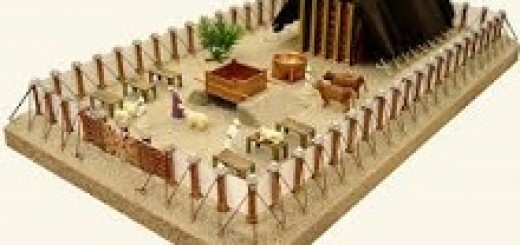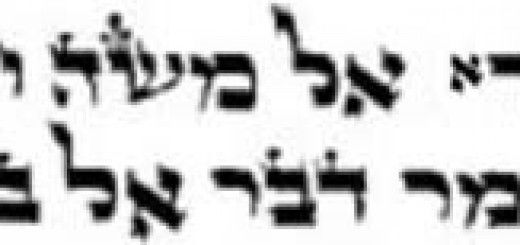By Avner Friedmann
Our parasha speaks about the beginning of the first exile the Jewish people experienced among the nations- the exile of Egypt. Before Jacob and the tribes went down to Egypt, they already designated Goshen as their place of residence. Goshen was Egypt’s most fertile region east of the Nile delta, and is described as “the best part of the land”[1]. Goshen is mentioned many times throughout our parasha; here are some of them: Joseph said to his brothers: “You will reside in the land of Goshen”[2]. Then Jacob sent Yehuda, the leader, ahead of the family to make the proper arrangements for their settlement in that region[3]: “He sent Yehuda ahead of him to Joseph, to prepare ahead of him in Goshen.” Afterwards Joseph instructed his brothers[4]: “And it shall be when Pharaoh summons you…then you are to say, ‘your servants have been cattlemen’…so that you may be able to settle on the region of Goshen.” After they came before him, Pharaoh said to Joseph[5]: “in the best part of the land settle your father and your brothers; let them settle in the region of Goshen.” And the parasha ends with[6]: “Thus Israel settled in the land of Egypt in the region of Goshen; they acquired property in it and they were fruitful and multiplied greatly.” This begs the question; what is so important about this land that Joseph, Jacob, and the brothers had to make such an effort to settle there?
The connection to Goshen actually began much earlier with Sarah our matriarch. In parashat Lech Lecha Avraham and Sarah went down to Egypt. The Midrash says[7] that due to Pharaoh’s desire for Sarah; he wrote her a marriage contract, assigning to her wealth and possessions, as well as giving her as inheritance the land of Goshen. Pharaoh did that in an attempt to influence Sarah to leave everything and become his wife. The word Goshen comes from the root to approach, to come near (גש), the same root as the name of our parasha Vayigash (ויגש) – “Then Yehuda approached him”. Pharaoh’s intention was to have a closer connection with Sarah; but Sarah was not tempted and stayed faithful to Avraham. It turned out that Goshen did not contribute to any closeness, but on the contrary; because of Sarah it later became a symbol of keeping seperate from the surrounding Gentiles.
This region was isolated. Joseph wanted to make sure they were kept away from the corrupting influence of Egyptian idolatrous and immoral society. Being a grazing land, it also gave them an opportunity to make a living at their profession as shepherds. In this respect, Goshen was the first Jewish “ghetto” in history. Even though the concept of ghetto today has a negative connotation, it has served a good purpose. The ghetto allowed the Jews to live among themselves and pursue their way of life without interference from the outside. This concept is not just a good idea, says Mima’amakim[8], but according to the Rambam, it is the Halacha. Rambam[9] writes that people are influenced by their surroundings in terms of their opinions and deeds and will acquire the culture and customs of the country they are in. Therefore Jews should separate themselves, connect to righteous individuals, and learn from their deeds. Mima’amakim adds, however, that sometimes there is a need to be connected to the society around us for the purpose of bringing Jews back to Judaism, for making a living and the like[10].
The Zohar[11] brings a deeper reason for settling in Goshen. This region was lush and was always designated as the lamb’s grazing area. The lamb is the zodiac sign of Nisan (Aries), and was the main deity of Egypt. The month of Nisan is the first month of the year and is associated with the spring (Aviv-אביב in Hebrew. The word Aviv consists of two words which in Hebrew means ‘father of 12’, i.e. the “head of the twelve months”). As such the lamb contains a special power, which the Egyptians recognized and harnessed.
Come and see the wisdom of Joseph, says the Zohar. With his influence he arranged for his brothers to become the shepherds of the Egyptian deity, as it is written[12]: “From the least of his brothers he (Joseph) took five men and presented them to Pharaoh”, and he instructed them to say[13]: “Your servants have been shepherds from our youth until now… so that you may be able to settle on the region of Goshen”. Joseph directed them so that they would inherit Goshen and be admired by the Egyptians for shepherding their deity. (The Zohar proves that whoever shepherds the lamb was the most respected individual in Egypt). It is difficult to understand why Joseph would make his brothers become associated with this deity that the Egyptian bowed to. The Zohar explains: The Egyptians worshiped the lamb, and by doing so received their abundance from the source of the lamb above. Joseph’s intention was that as shepherds, with their holiness, the tribes spiritually would gain control and rule over the Egyptian deity below, and as a result would rule over their power source above. This will then lead to Israel subjugating the Egyptians themselves, because when one controls the idol, one controls the idol worshiper as well. Once they controlled the Egyptians below, Egypt’s ministering angel above would be under their control as well. The tribes ended up bringing the Egyptian idol worshiping into submission. This is why HaShem made pharaoh say to Joseph, “Appoint them as rulers over the livestock that belongs to me”[14].
At the end of this process we find Passover- the night of the redemption. In the month of Nissan, when the sign of the lamb is dominant, God commanded the Children of Israel to take the lamb from the Egyptians, slaughter it, take out all its blood (its life force), sacrifice it, and then eat it. By doing so they completely nullified the impurity of this idol, and demonstrated that they were above the zodiac signs and their influences. This is the final act in the process that Joseph initiated. From that moment on, every year on the same night of Passover, we are commanded to repeat the same mitzvah. We bring the sacrificial lamb to the Temple and eat it. Since we don’t have the Temple today, the lamb is replaced by the Afikoman.
This is the importance of the land of Goshen. What this land symbolized then, is just as relevant now. In the merit of righteous Sarah and the righteous women during the exile of Egypt, we were redeemed then. May we merit the same soon and be redeemed “In later times as in earlier times” speedily in our days, Amen.
[1] 46:7.
[2] 45:10.
[3] 46:28.
[4] 46:33-34.
[5] 47:5-6.
[6] 47:27.
[7] R’ Yehoshua from Pirkei R’ Eliezer 26, as brought by Mima’amakim.
[8] Mima’amakim, Beresheet p. 241.
[9] Deot, Perek 6a.
[10] The specifics must be discussed with the Rabbis.
[11] Pinchas 250b-251a.
[12] 47:2.
[13] 46:34.
[14] 47:6.






















